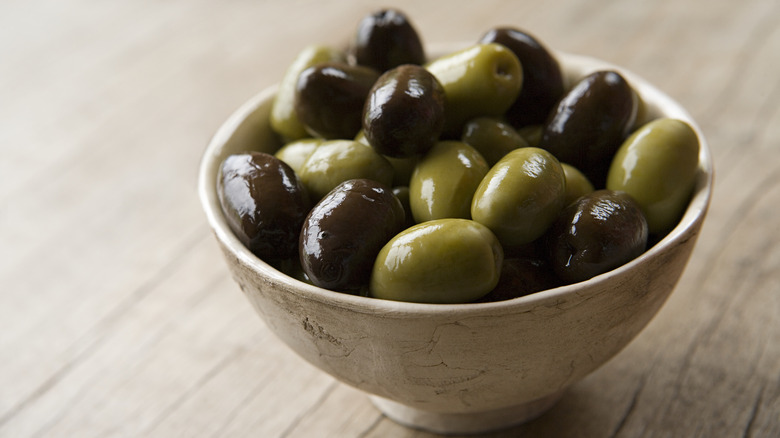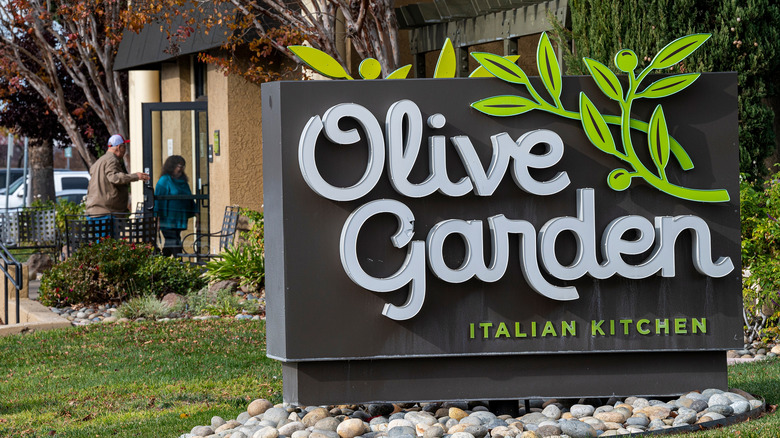It's Ironically Difficult To Find Olives At Olive Garden
Olive Garden's menu has always been fairly diverse, seeking to provide customers with a broad, albeit not always particularly authentic, version of Italian food. Naturally, there's always been a wealth of different pasta dishes, various spins on chicken parm, and of course those endless soups, salads, and breadsticks. Likewise, many of the ingredients are those you would expect to find: marinara sauce, parmesan cheese, tomatoes, and the like. One ingredient, however, is conspicuously, almost entirely absent from the menu: olives. Helen Rosner pointed this out in her James Beard Award-nominated 2017 article for Eater, "Christ in the Garden of Endless Breadsticks."
"Despite the promises of the name, it can be a challenge to find actual olives at Olive Garden," wrote Rosner. "The omission is intentional, though the irony is not. It's a simple matter of marketing: People don't like olives." Rosner wrote that though there are a few dishes with olives mixed in, many olive-forward dishes did seem to vanish off the menu relatively quickly. She also wrote that there were two places where olives could always be found in the chain restaurants' locations. These are the bar, where they sit ready to be used in martinis, and in the restaurant's salads, which are required to include exactly two black olives.
Even in this case, however, Rosner recounted a conversation with a server who said that about half her tables either ask for the olives to be left out of the salad, or simply leave them, uneaten, on the table.
Some people really dislike olives
For sure, olives can be a polarizing food. In a 2015 article in Mic, Tove Danovich noted that those who don't like olives can be particularly vociferous in their dislike, comparing them to haters of Brussels sprouts and cilantro. The article also pointed out that the way olives tend to be mass-processed may be at least partially to blame for such strong hatred.
Still, while we may not have access to the specific marketing research Olive Garden does, the claim that olives are so widely despised may raise a few eyebrows. Olives are a staple, not just in much of Italian cuisine, but Spanish and Iberian cooking, Greek food, Turkish food, various Middle Eastern and North African cuisines, and pretty much any kind of food that has its origins around the Mediterranean Sea, where olives have been cultivated for as long as 8,000 years.
Today, olive trees are cultivated on every continent save Antarctica, and show up in recipes flung well far from the sunny Mediterranean. For such a ubiquitous food to be so widely rejected by the restaurant's clientele is surprising. Still, while the paucity of dishes that prominently feature olives may be disarming, it does bear stressing that Helen Rosner's conversation with the server at an Olive Garden location is somewhat anecdotal.
Why name it the Olive Garden, then?
Something to keep in mind is that in the 40 years since the restaurant's first location opened in Orlando, Olive Garden's menu has changed substantially. While it's hard to tell whether the original version of the Olive Garden more prominently featured olives, the irony remains. It also begs a question: why name the restaurant Olive Garden in the first place?
The name seems particularly odd — and the question made a bit more pressing — in light of the fact that, at least in the English language food parlance, olive gardens don't really exist. A large group of olive trees, such as the kind you will find on a farm that grows olives or produces olive oil, is most commonly called a grove, not a garden. And though many locations will have a small garden out front, it's not exactly a key part of the chain's image either.
Without a doubt, anyone who takes the name of a restaurant literally (or any other business establishment, for that matter) is bound to be frustrated. As she wrote, Helen Rosner's query as to where all the olives were at Olive Garden was met with a bemused reaction from the server she spoke with. According to Rosner, it's typically the middle-aged male customers who impishly ask those kinds of questions. In other words, the kinds of people who think through these things are also prone to dad jokes.


